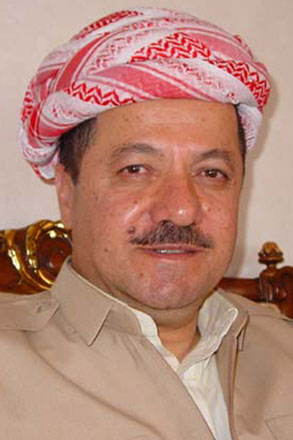Iraqi Kurdish leader has said his regional administration has been in talks with the terrorist Kurdistan Workers' Party (PKK) to stop their assaults against Turkey and will exercise the maximum pressure on the terrorist organization, Today's Zaman reported.
"We are in contact (with the PKK) and will exercise the maximum pressure on the PKK to stop their military operations because this is playing with the fate of the Kurdish people," said Massoud Barzani, himself a former militant leader.
Attacks by the PKK members on Turkish military have prompted Ankara to launch airstrikes on the Iraqi border mountains since August this year.
"Now is not the time for military operations, one can fight for a cause in peaceful and democratic ways, this is the solution," Barzani told Reuters in an interview.
His region is facing shelling and air strikes by troops in neighboring Iran and Turkey who are trying to strike camps run by the PKK and its Iranian offshoot PJAK. Both use the Iraqi border mountains as a refuge from Turkish and Iranian military.
Shelling and air strikes have forced some Kurdish villagers from their homes along the border.
Barzani said his government could consider sending local Kurdish Peshmerga forces to the region's borders with Iran if the situation deteriorated further.
Future status of Kirkuk
Speaking about the US withdrawal and the future status of Kirkuk, Barzani said the US withdrawal from Iraq next month will not impact security in the semi-autonomous Kurdish region, but Baghdad's delay deciding the fate of the disputed city of Kirkuk could prove "dangerous."
He said he is ready to work with the central government to avoid a deterioration in security as Washington pulls out its remaining 13,000 troops by the end of December.
"The US withdrawal will not have any impact on the security situation in the Kurdistan region, because there have been no American forces in the region. As for the rest of Iraq's security, there is a worry," he said.
"We are ready to cooperate with Baghdad so as not to allow any security breach or void," he said.
Baghdad and northern Iraqi capital Arbil have a long-running dispute over territory and oil rights along their internal border, especially over who controls Kirkuk city, which sits atop some of the world's largest oil reserves.
A census to determine whether the city has a Kurdish or Arab majority that would back up either claim has been repeatedly delayed. The tussle over the disputed territories is seen as a potential flashpoint as US troops withdraw.
Barzani said his administration will continue demanding a vote on the fate of Kirkuk -- claimed by the Kurds as their ancestral homeland -- without any concessions.
"We have exercised the maximum levels of flexibility on this issue and when we approved article 140, we had no doubt on the identity of these areas, they are Kurdish areas," Barzani said.
Article 140 in the Iraqi constitution calls for a resolution of dispute areas through different stages including voting in a referendum. The census would be a key initial step toward a vote on resolving the territorial dispute.
"The future of Kirkuk is linked to the execution of article 140, if this article was executed then the issue of Kirkuk would be solved and the people of Kirkuk are the ones who will decide their fate," he said. "If there are delays or (attempts) to avoid the Iraqi constitution, then the future will be really very dangerous."
Iraq territories disputed by Kurds and the Arab-led government in Baghdad, include Kirkuk and areas in the troubled northern Nineveh province.
Asked if he was willing to offer concessions to Baghdad by giving away Kirkuk to solve a long-standing row over oil revenue and contracts, Barzani said: "No way. This is an identity issue, an issue of honor, an issue of dignity, how could we? The issue of oil and gas is another subject, you can never link them."






